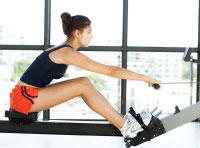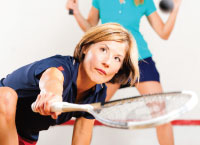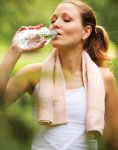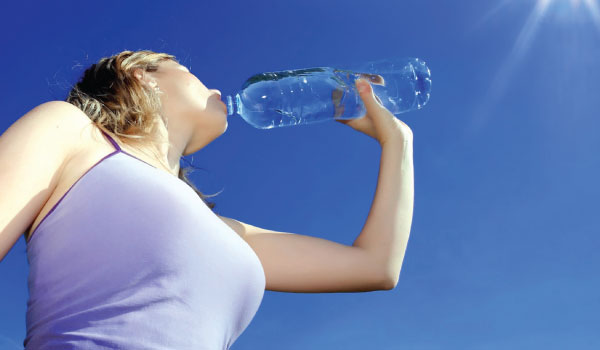It’s only May but the summer season is here, staying for months to come. Living on a desert island, we expect intense heat layered with sticky humidity. But should this stop us from going about our regular fitness routine outdoors? Yes and no say the experts.
 You might have to tailor what you do according to the time of day or simply move indoors. What you need is a little common sense and a lot of water! If you are the gym bunny type, the hot weather could signal a perfect time to shake up your regular routine and reach your fitness goals.
You might have to tailor what you do according to the time of day or simply move indoors. What you need is a little common sense and a lot of water! If you are the gym bunny type, the hot weather could signal a perfect time to shake up your regular routine and reach your fitness goals.
Don’t fear the heat
Our expert: Craig Heslop, founder and tribal coach, Tribal Fitness
The modern lifestyle allows for less movement whether sitting at a desk, watching television or driving. Here in Bahrain, we are particularly susceptible to a sedentary way of living with services readily available to have our cars washed, gardens pruned and homes cleaned.
We are forced into air- conditioned surroundings and do less and less which impacts our health and fitness. Tribal Fitness, founded in Bahrain a few years ago, aims to return individuals back to their clean-living roots through natural movements, healthy eating and living.
Ever wonder what cavemen did to combat the heat back in the day when they trudged off to hunt for food?
“They were smart and limited their movements to certain times of the day. They didn’t have to slap on sunscreen,” says Craig. “They moved around in the early morning and evening and avoided the intense heat during the day. They had respect for the sun, its strength and danger.”
You might not have to hunt for your food today; but one way or another you have got to move to find your way to the supermarket. We don’t move nearly as much as we used to particularly in Bahrain where footpaths and parks are limited. Yet there is an expanse of desert landscape ready to be explored.
“When we go for a walk, we use the treadmill and stare at a screen and in our peripheral vision we have nothing but the walls of the gym. Our senses are dulled and we are neither awake nor alert,” he explains.
So what can you do? Walk, run or move for short stints of 15 minutes before the school run or heading to work. Take advantage of the beautiful island sunsets and get out and move.
 Although Craig is confident we can acclimatise to the heat for short exercises outdoors, provided we drink plenty of water, not everyone is keen on the heat. Tribal Fitness uses its gym space to accommodate those wanting to beat the heat. Overall, this expert says we should not fear the heat, but work around it.
Although Craig is confident we can acclimatise to the heat for short exercises outdoors, provided we drink plenty of water, not everyone is keen on the heat. Tribal Fitness uses its gym space to accommodate those wanting to beat the heat. Overall, this expert says we should not fear the heat, but work around it.
If you train regularly throughout the year, the hot weather presents a golden opportunity to optimise your routine. Look at what works and what doesn’t and fine tune it. Change your focus from exercise to what is happening with your health. Health and fitness go hand in hand, but are two different things. You can be super fit and unhealthy at the same time.
For your 15 minute walk, run or swim, add weight bearing exercises a couple of times a week and with this, you have the makings of a solid summer routine. Plus, walking outside in the early morning sunlight has the additional bonus of providing our bodies with Vitamin D.
People tend to stay indoors during the summer and our vitamin D levels drop significantly. Vitamin D is produced by the body from sunlight exposure and is essential to good bone health. Experts recommend testing your vitamin levels now and getting retested in a few months time to make sure your body has a sufficient amount.
Change your focus
Our expert: Chris Rawlinson, manager,
Oxygen Gym
 Whatever exercises you can do outdoors, there is always an alternative inside a gym. Doing push-ups outdoors can be likened to performing the bench press. Cycling outdoors can be done on stationary bikes. A run along the beach equals a run on the treadmill.
Whatever exercises you can do outdoors, there is always an alternative inside a gym. Doing push-ups outdoors can be likened to performing the bench press. Cycling outdoors can be done on stationary bikes. A run along the beach equals a run on the treadmill.
“Of course it’s nice to go for a scenic run outdoors. But realistically, we live in one of the hottest places on Earth. So there are times of the year when you need to do indoor workouts,” says Chris.
Change your routine
Exercising indoors is fun and is the next best thing if you are used to training outdoors. Chris sees an influx of people in the gym at this time of year looking for the ultimate beach body. He also sees people who want to get out of the heat and need advice on what they can do inside the gym.
“It’s a good time now to change your exercise routine,” says Chris, emphasising the need to always tweak our routines every six weeks with slight variations and progressions such as more reps or sets. For women, resistance training is particularly important for bone health, posture and body changes during significant life changes such as childbirth and menopause.
So what does the ideal summer gym workout look like? Chris explains that through thousands of personal training hours, there is no one ideal workout as everyone has different goals. His advice is to opt for a mix of cardio and resistance training. A good workout is where you know what you are doing and the technique is correct.
For someone who trains outdoors, gyms can be intimidating with complicated looking machines and people who look like they know what they are doing.
“You just have to come in and give it a try. Being in a gym is very sociable,” he assures.
If you do decide to stay outdoors, Chris echoes our experts’ advice to drink plenty of water and pay attention to hydration levels both outdoors or in the gym.
“Sports drinks have their place in fitness but you can’t beat good old H2O,” says Chris.
Step by step
Our expert: Tom Jankowski, health fitness specialist, Bahrain Rugby Football Club
It’s not unusual for Bahrain’s temperature to soar well into the high 40s and beyond. At a certain point in the summer, there is no ideal time of day as it stays hot all day long. “Even early morning or late evening workouts should be approached with caution or moved indoors,” says Tom. Be prepared for the heat when exercising outdoors and stay safe and healthy.
 The right time of day: Even the fittest people can succumb to the dangers of exercising in extreme heat. Heat-related illness can be avoided by staying out of midday sun, being careful to not overexert yourself or exercising indoors.
The right time of day: Even the fittest people can succumb to the dangers of exercising in extreme heat. Heat-related illness can be avoided by staying out of midday sun, being careful to not overexert yourself or exercising indoors.
“Some people may acclimatise to the weather, but every person is different and you need to know your limitations. There’s no need to train when the sun is at its strongest,” he says.
Listen to your body: Exercising outdoors in the heat is not the best time to ramp up the intensity of your workout.
“The heat puts extra stress on our bodies. My advice would be to look at shortening your workout or decreasing the intensity. If you start to feel really overheated or unusually sick, then you know you may have pushed it too much and need to stop,” Tom adds.
If you have a pre-existing condition such as asthma, heart problems or take certain medications, you need to be careful. Extreme heat can result in serious illness or even death if you do not take the proper precautions. Talk with your doctor about what you can do.
Stay hydrated: Drink plenty of cold liquids throughout the day, before and during your workout. Depending on the length of your workout, having a sports drink after to replenish carbs and sodium levels might also be a good idea. Don’t just drink when you are thirsty.
“Carry a large bottle of water with you outside when you train, run, walk or even when you swim at the pool. People may not realise how dehydrated swimming in the heat can make you,” advises Tom.
Dress smartly: Lightweight, breathable and light-coloured exercise clothing will keep you cool. Opt for wicking fabrics that remove the sweat from the body instead of cotton fabrics that get wet and heavy. Remember to be sun smart as you dress; apply sunscreen on exposed body parts if you are training for more than 15 minutes outdoors.
Know when to stop: Symptoms of heat-related illness include dizziness, faintness, headache, muscle cramping, nausea or vomiting, rapid breathing, confusion, goose bumps and extreme thirst. Stop, move to a shaded area and have a cool drink. Seek medical attention if symptoms persist.





































